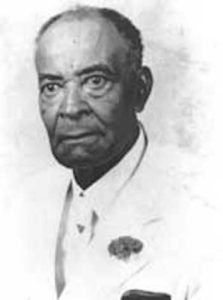
Dr. John H. Lowery
*John Lowery was born on this date in 1860. He was a Black physician, businessman, and politician.
From Plaquemine, Iberville Parish, Louisiana, John Harvey Lowery was one of 19 children of John Harvey Lowery Sr., a bricklayer from Virginia, and Elizabeth (Carson) Lowery, a mid-wife of Madagascan ancestry. Little is known about John H. Lowery’s early education. However, he did complete a full course of studies at Straight University in New Orleans. He then studied medicine at the Flint Goodrich Hospital in New Orleans and graduated with a Doctor of Medicine Degree from New Orleans University in 1894.
While studying to become a doctor, Lowery married Elizabeth Conway, who preceded him in death. He married again in 1927 to Mary L. Brown. His union with Elizabeth Conway produced three children. He fathered an additional child during his second marriage to Mary L. Brown. His Daughter, Mary Lowery Munson Runge, a pharmacist, became the first Black woman president of the American Pharmacists Association.
In 1895, a young physician, Dr. Lowery, established his medical practice in Donaldsonville along the Mississippi River. One of his first real estate investments still stands on 412 Charles Street. This structure would later become the home of Dr. J. Sidney Brazier, who would also become his son-in-law after his marriage to Evelyn Lowery.
Dr. Lowery became one of the most successful black businessmen in Donaldsonville and Louisiana through investments in real estate, numbering some 50 pieces of property in the Donaldsonville historic district, but through his considerable success as a planter. He offered full-time, year-round employment to more than 200 men and women on his sugar cane and rice plantations in Modeste, Louisiana. He also owned and operated a mercantile department store and ran one of the first pharmacies in Donaldsonville. He served on the Board of Directors of the People’s Industrial Life Insurance Co. in New Orleans. Evidence indicates that he and his business partners were at one point in establishing a bank in Baton Rouge, Louisiana.
He was a Republican all his life and served as a member of the State Central Committee. Beginning in 1884, he was a delegate to every national Republican convention in the United States and the first African American Chairman of the Louisiana State Republican Party. Dr. Lowery actively fought against discrimination. Through the actions of the State Railroad Commission (the forerunner of the Louisiana Public Service Commission), he campaigned to order equal accommodations for the races on the segregated railroads of Louisiana.
In 1937, Dr. Lowery sponsored a movement to build a new modern school for black youths in Ascension Parish, Louisiana. His generous contributions made the school named the Lowery Training School in his honor. When the school fell hard, he paid the teachers' salaries for a year. The elementary and intermediate schools in Donaldsonville still bear his name. Lowery also donated land for a school in Modeste, a rural community between Donaldsonville and White Castle. Until his death, Dr. Lowery served as the Secretary of the Endowment Department of the District Grand Lodge of Odd Fellows for Louisiana. He was also a prominent member of the Grand General Independent Order of Brothers and Sisters of Charity North America, South America, Liberia, and Adjacent Islands (G. G. I. O. of B. & S. of L. & C.).
Dr. John Harvey Lowery died at the Flint-Goodridge Hospital in New Orleans, Louisiana, on September 25, 1941. Although he was a Methodist, he is interred in the Ascension Catholic Cemetery in Donaldsonville, Louisiana.
Michael L. Wilson, Secretary
John Harvey Lowery Foundation
509 Lessard Street
Donaldsonville, Louisiana